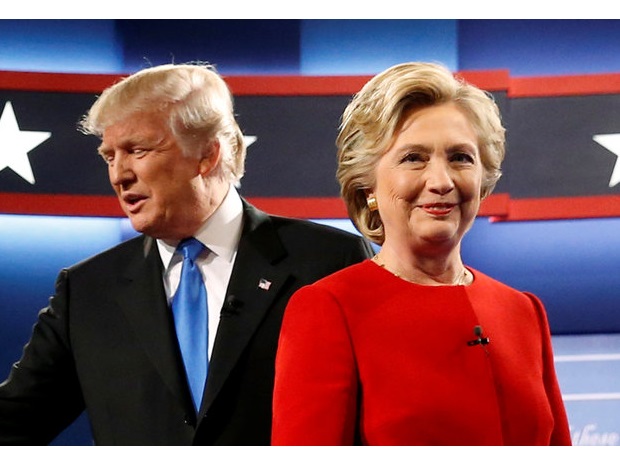I was able to watch the first 2016 presidential debate at the Hinckley Institute’s “Watch Party,” seeing the live event in the same room as about a hundred other students as well as members of the general public. I’m glad I did. If I hadn’t, I would have missed the gasps, laughs and shocked expressions the Hinckley crowd couldn’t keep inside during some of the more dramatic moments of the debate. Though it differed in many ways from your typical presidential debate, with more zingers, pointed attacks and interruptions, it nonetheless succeeded at being a platform for each candidate to present their policies and their personality to the audience. On this front, Democratic candidate Hillary Clinton was the clear winner.
Both candidates had different goals going into the debate. Republican Candidate Donald Trump, whose temperament has been called into question and who previously resorted to slinging insults at Republican primary debates, needed to seem calm and collected. Clinton, plagued by scandals and an inability to relate to voters, aimed to be seen as knowledgable without being too wordy and assertive without seeming too aggressive. The stakes this year were even higher because of the large number of Americans who have declared their support for third-party candidates and therefore might have been swayed by the debate.
In the end Clinton stayed on the offensive, launching many attacks at Trump throughout the night. She brought up the fact that Trump probably doesn’t pay income tax and that Trump at one point said he wished the housing market would fail so his business could take advantage of it. She even dredged up a comment Trump had made about Miss Universe winner Alicia Machado, in which he called her “Miss Piggy” and “Miss Housekeeping.” Clinton’s performance was also heavy on zingers, some of which drew applause and laughter even from the sworn-to-silence audience attending the live debate. Needless to say, the Hinckley crowd had even louder reactions. She called out Trump for living in his “own reality,” called Trump’s tax plan “Trumped-up trickle down” and responded successfully to Trump’s claim that she hadn’t campaigned lately by saying she used the time to prepare for the debate and “to be president.”
Donald Trump didn’t seem to succeed at presenting himself in a calm, “presidential” manner. The general lack of crowd participation was visible on Trump, who, though still somewhat high-energy, often looked as though he had no place to direct it. Nevertheless, he repeatedly interrupted both Clinton and the moderator. At one point he argued with moderator Lester Holt over the facts of whether he endorsed the Iraq war in an interview. Though he would try to answer Hillary’s attacks by interrupting her, his off-the-cuff responses often did more harm than good. When Hillary mentioned that Trump had wished for the housing crisis Trump interrupted her to clarify that “that’s called business, by the way” – a statement that only seemed to support her portrait of him as out-of-touch with most Americans.
Trump’s performance was not without its successes. Trump himself scored applause from the crowd a few times during the debate, such as when he brought up Clinton’s e-mail scandal. Clinton’s response – an unqualified apology – seemed to dent but not fully diminish the gain. Ultimately, however, Clinton’s successes far outweighed Trump’s and her performance seemed to do a good job of making her appear relatable. It may be that a debate is not the place for Trump’s energetic style to shine, and if this is the case he might also have trouble in the next two debates.
I’m not alone in thinking Hillary won the debate. At the Hinckley event, when the crowd was asked who they thought won, a majority clapped for Clinton while only a few thought that Trump did the better job. This has also been supported by a variety of focus groups and polls. Donald Trump, however, maintains that he won the debate.
What does victory mean for Clinton? Possibly less than you’d expect. Those who choose to watch the debate are usually the ones that already feel strongly about one candidate or the other. Nevertheless, there has been a demonstrated correlation between the CNN poll of debate watchers and the changes in candidate approval in the few days following the debate. This year, the CNN poll found that respondents thought Clinton won by a 35-point margin. With this taken into consideration, statistician Nate Silver predicts that the debate will help Clinton gain around 2-4 percentage points in the national polls.
US Presidential Debate Photo: Reuters


